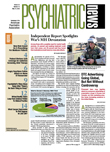Federal health insurance coverage for about 5.6 million eligible federal workers in the United States will now, for the first time, include substance abuse screening and brief intervention (SBI).
Experts say SBI is a quick and effective early intervention procedure that primary care and other physicians can use to identify and initiate behavior change in individuals struggling with substance abuse problems. Nonpsychiatric physicians will be able to refer such patients as necessary to psychiatrists, mental health providers, or substance abuse experts.
The White House Office of National Drug Control Policy (ONDCP) announced the new coverage in April. It specifically applies to federal workers covered by the Federal Employees Health Benefits Program (FEHBP). The program, administered by the U.S. Office of Personnel Management (OPM), is considered the largest employer health insurance program in the country.
Expanding FEHBP coverage this way is quite significant, Darrel Regier, M.D., M.P.H., APA's director of research, told Psychiatric News. He said it shows that White House policymakers recognize the importance of addressing as early as possible the physical and psychiatric components of substance abuse by physicians other than psychiatrists.
“I applaud the federal insurers for recognizing the merits and benefits of SBI for their members,” said Bertha Madras, Ph.D., deputy director for demand reduction at the ONDCP, in a press statement. “By opening the lines of communication between doctors and patients, SBI can help identify users and reduce substance use and its associated consequences. It will ultimately help them to access the treatment they need.”
The ONDCP hopes that screening and brief intervention coverage for millions of federal workers will be an added incentive for primary care physicians and other medical doctors to identify and provide early intervention to federal workers suspected of substance abuse or at high risk for such abuse.
SBI is an evidence-based, medical procedure, according to the ONDCP press statement. The goal of SBI is to facilitate a constructive dialogue between physicians and their patients about the harms of substance abuse, the risks for addiction and the strategies to help patients achieve sobriety.
Much of the evidence about the efficacy of SBI is based on the federally funded Screening, Brief Intervention, Referral, and Treatment demonstration program known as SBIRT. SBIRT now operates in 17 states—in hospitals, primary care clinics, and offices; on college campuses; and in health care delivery systems on native-American tribal lands. The Substance Abuse and Mental Health Services Administration (SAMHSA) reported that as of this past February, more than 605,469 SBIRT patients were screened, and more than 22 percent screened positive. Sixteen percent of these received brief intervention, 3.7 percent received brief treatment, and 3.7 percent were referred to a specialized drug treatment program. Six months after the brief intervention, patients showed significant declines in substance abuse.
The goal of the SBI initiative for federal employees is similar to the goal of the Depression Care Improvement Study, a collaborative, early intervention initiative involving APA, the American Academy of Family Physicians, and the American College of Physicians, said Regier.
“Having physicians involved in the screening procedure is very important,” he said. “The key is how it will be implemented. Adding a new benefit like this is potentially seen as a burden,” he said, so having the two new
CPT codes is important as a [financial] incentive for implementation (see
CPT Codes for Screening, Intervention).
More information about SBIRT is posted on the SAMHSA Web site at<http://sbirt.samhsa.gov/about.htm>. More information about the SBI initiative is posted at<www.ondcp.gov/treat/screen_brief_intv.html>.▪
